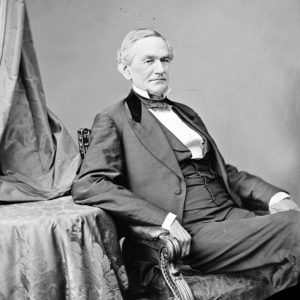calsfoundation@cals.org
John Smith Phelps (1814–1886)
As the Civil War military governor of Arkansas and a longtime Missouri congressman, John Smith Phelps began his involvement with Arkansas before the Civil War. A stalwart Democrat, he raised a Union regiment and fought at the Battle of Pea Ridge prior to his appointment as military governor. Cotton politics and personal illness doomed his attempt to establish a Union government in 1862 and led to his removal in 1863.
John S. Phelps was born on December 22, 1814, in Simsbury, Connecticut, to Elisha Phelps and Lucy Smith Phelps; he was one of five children. His father was a sometime congressman (1819–1821, 1825–1829). After a public school education, young Phelps attended Washington College (subsequently Trinity College) in Hartford, Connecticut, but refused to participate in the commencement service with the class of 1832 and belatedly received his degree in 1859. After graduation, he studied law with his father and married a divorced woman, Mary Whitney of Portland, Maine, on April 30, 1837; they had two children. Family opposition to the marriage caused the couple to move to Springfield, Missouri, where Phelps entered into the practice of law. Elected to the state legislature in 1840, he won a seat in Congress in 1844, serving until 1863. Prominent in education circles as a supporter of the Far West Seminary, he also favored westward expansion and improved postal services.
At the outbreak of the Civil War, Phelps organized a Union regiment. His wife hid the body of Union general Nathaniel Lyon following the Battle of Wilson’s Creek on August 10, 1861. Phelps was part of the Union invasion of Arkansas in the spring of 1862 and was accompanied by his wife, whom some consider the first female Union army nurse in the Trans-Mississippi. On November 29, 1862, Phelps was promoted to the rank of brigadier general, with the appointment postdated to July 19. However, the Senate refused to confirm his appointment.
In July 1862, Phelps was appointed military governor of Arkansas and also initially of Louisiana. His instructions from Secretary of War Edwin M. Stanton were to “re-establish the authority of the Federal Government in the State of Arkansas,” while displaying “wisdom and energetic action” as well as “sound discretion.” Union control was then largely limited to Helena (Phillips County) and its environs. Phelps was highly critical of General Samuel Curtis for not liberating more of Arkansas following the Union victory at the Battle of Pea Ridge and was disgusted with the speculation in cotton, often involving officers. Both captured cotton and purchased cotton were in great demand in the North. Speculators followed the armies and often worked hand-in-hand with officers in this lucrative trade. General Ulysses S. Grant attempted to stop the practice by ordering the expulsion of all Jews, an order overturned by President Abraham Lincoln. Phelps described speculation as “the order of the day” at Helena, even though the bigger market of Memphis, Tennessee, attracted more attention.
A legalist, Phelps also took exception to Curtis’s issuance of “freedom papers” to African Americans who had fled the plantations. He found the military force at Helena sick, demoralized, and too large “to coop up in this place and too small” for another campaign. His complaints about conditions touched off a running controversy about the status of slavery and Union military goals. Politically, as a War Democrat, he could not count on friends in Washington DC to make his case. Repeatedly ill, he spent much of his time in St. Louis, Missouri, and relied on Amos F. Eno, his adjutant general, for regular reports.
On July 9, 1863, the office of military governor was abolished, and all of Phelps’s actions were “revoked and annulled.” Phelps then served as colonel of the Seventy-second Regiment of the Enrolled Missouri Militia, participating in campaigns in southwest Missouri, notably in the aftermath of Confederate general Sterling Price’s retreat though the region following his defeat at the Battle of Westport on October 23, 1864. During war, his son, John Elisha Phelps, served as a colonel in the Second Arkansas Cavalry regiment, seeing service in Arkansas and Missouri.
He ran for governor of Missouri in 1868 but, due to the highly restrictive voter qualifications then in effect, was defeated. Following the overthrow of the Radical Republicans, he was successfully elected in 1876, serving one four-year term.
Phelps’s wife was granted $20,000 by Congress for her wartime services and used the money to establish an orphanage. One of the leading proponents of women’s suffrage, she testified at the Missouri Constitutional Convention on behalf of women’s right to vote in 1865 and served as a vice president of the National Woman Suffrage Association.
During his lifetime, Phelps was acquainted with Arkansas affairs, largely through his connections with the leaders in northwest Arkansas. Although a Democrat, he supported modernization. A slaveholder, he defended loyal Unionists’ property rights, thus putting him at odds with Radical Republicans in Missouri and nationwide.
Phelps died on November 20, 1886, and is buried in Hazelwood Cemetery in Springfield.
For additional information:
Christensen, Lawrence O., William E. Foley, Gary R. Kremer, and Kenneth H. Winn, eds. Dictionary of Missouri Biography. Columbia: University of Missouri Press, 1999.
“John Smith Phelps.” In Dictionary of American Biography. New York: Charles Scribner’s Sons, 1930.
Warner, Ezra. Generals in Blue: Lives of the Union Commanders. Baton Rouge: Louisiana State University Press, 1964.
Michael B. Dougan
Jonesboro, Arkansas





Comments
No comments on this entry yet.